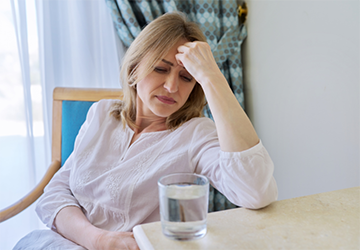How to Manage Menopause Symptoms
Menopause is a natural part of ageing for women, typically occurring in their late 40s to early 50s. It's marked by the end of menstrual cycles, diagnosed after going 12 months without a period. Menopause brings various symptoms due to hormonal changes, primarily the decrease in estrogen. These symptoms can include hot flashes, night sweats, mood swings, weight gain, and sleep disturbances, which can significantly impact daily life. Managing these symptoms is crucial for maintaining quality of life.
Menopause is a natural part of ageing for women, typically occurring in their late 40s to early 50s. It's marked by the end of menstrual cycles, diagnosed after going 12 months without a period. Menopause brings various symptoms due to hormonal changes, primarily the decrease in estrogen. These symptoms can include hot flashes, night sweats, mood swings, weight gain, and sleep disturbances, which can significantly impact daily life. Managing these symptoms is crucial for maintaining quality of life.

Here, we explore practical ways to manage menopause symptoms effectively, offering a holistic approach that encompasses lifestyle changes, dietary adjustments, and medical treatments. By understanding and addressing these symptoms, women can navigate menopause with greater ease and comfort.
Understanding Menopause Symptoms
Common symptoms include hot flashes, night sweats, mood swings, weight gain, and sleep disturbances. Others may experience vaginal dryness, loss of libido, and cognitive changes like memory lapses. These symptoms vary in intensity and duration for each woman.
Lifestyle Changes
Balanced Diet
Eating a healthy, balanced diet can help manage menopause symptoms. Focus on fruits, vegetables, whole grains, and lean proteins. Foods rich in calcium and vitamin D are essential for bone health, as the risk of osteoporosis increases during menopause. Incorporate dairy products, leafy greens, and fortified foods into your diet.
Regular Exercise
Regular physical activity helps control weight, improves mood, and enhances overall health. Aim for at least 30 minutes of moderate exercise most days of the week. Activities like walking, swimming, and yoga are beneficial. Strength training exercises help maintain muscle mass and bone density.
Stay Hydrated
Drinking plenty of water is essential for managing symptoms like bloating and dryness, helping your body function optimally, and maintaining healthy skin. Aim for at least eight glasses a day. Herbal teas, like chamomile or peppermint, can also be soothing and hydrating, offering relaxation and digestive benefits, making them great alternatives to plain water.
Avoid Triggers
Certain foods and drinks, like spicy foods, caffeine, and alcohol, can trigger hot flashes and discomfort by raising body temperature. To manage this, keep a symptom diary to track what you consume and the symptoms you experience. Identifying and avoiding specific triggers can significantly reduce the frequency and severity of hot flashes, enhancing daily comfort.
Hormone Therapy
Hormone Replacement Therapy (HRT) can effectively reduce menopause symptoms by replenishing estrogen levels. There are various forms, including pills, patches, gels, and creams. However, HRT isn't suitable for everyone due to potential risks, such as blood clots and certain cancers. Consult a healthcare provider to weigh the benefits and risks.
Non-Hormonal Medications
For those who can't or prefer not to use HRT, non-hormonal medications are available. Antidepressants, like SSRIs and SNRIs, can help with mood swings and hot flashes. Gabapentin and clonidine are other options that can reduce hot flashes. Some studies suggest that these medications can improve sleep quality and overall well-being.
Natural Remedies
Phytoestrogens: Phytoestrogens are plant-based compounds that mimic estrogen in the body. Foods like soy, flaxseeds, and legumes are rich in phytoestrogens and may help alleviate symptoms.
Herbal Supplements: Some women find relief using herbal supplements like black cohosh, red clover, and evening primrose oil. However, the effectiveness and safety of these supplements can differ, so it's essential to consult a healthcare provider before using them.
Acupuncture: Acupuncture can help some women reduce hot flashes and improve sleep quality. This traditional Chinese medicine technique involves inserting thin needles into specific points on the body.
Managing Mental Health
Mindfulness and Meditation: Mindfulness and meditation can help manage stress and improve emotional well-being. These techniques promote relaxation and reduce the frequency and severity of mood swings.

Cognitive Behavioral Therapy (CBT): CBT is a type of therapy that helps alter negative thought patterns and behaviours. It is effective in managing mood swings, anxiety, and depression related to menopause.
Support Groups: Joining a support group can provide emotional support and practical advice from other women experiencing similar challenges. It’s a safe space to share experiences and coping strategies.
Sleep Hygiene
Menopause can disrupt sleep due to night sweats and insomnia. Good sleep hygiene practices can help improve sleep quality.
Consistent Sleep Schedule: Going to bed and waking up simultaneously daily helps regulate your body's internal clock. Avoiding naps during the day can also promote better sleep at night.
Comfortable Sleep Environment: Ensure your bedroom is calm, dark, and quiet. Breathable bedding and lightweight, moisture-wicking pyjamas can help manage night sweats.
Relaxation Techniques: Practicing relaxation techniques before bed can promote better sleep. Activities like reading, calming music, or a warm bath can help you unwind.
Vaginal Health
Lubricants and Moisturizers: Vaginal dryness is a common symptom of menopause. Using water-based lubricants during sexual activity and vaginal moisturizers can help alleviate discomfort.
Regular Sexual Activity: Regular sexual activity can improve vaginal health by promoting blood flow and maintaining tissue elasticity.
Pelvic Floor Exercises: Pelvic floor exercises, or Kegels, can strengthen pelvic muscles, improve bladder control, and enhance sexual health.
Regular Health Check-ups
Regular visits to a healthcare provider are crucial during menopause. Routine screenings for breast cancer, osteoporosis, and cardiovascular health should be prioritized. Discuss any new or worsening symptoms with your healthcare provider to manage them effectively.
Embracing the Transition
Menopause is a natural phase of life. Embracing this transition and focusing on self-care can improve your quality of life. Stay informed about your health, make lifestyle adjustments, and seek support when needed.
Educate Yourself: Understanding what to expect during menopause can alleviate anxiety. Read books, attend workshops, and consult reliable sources for information.
Self-Care Practices: Prioritize self-care by engaging in activities that promote well-being. This includes hobbies, socializing, and relaxation techniques.
Positive Mindset: Adopting a positive mindset can make the transition smoother. Focus on the new opportunities this phase of life brings, such as more time for personal growth and hobbies.
Conclusion
Managing menopause symptoms involves lifestyle changes, medical treatments, and self-care practices. By staying informed and proactive, you can navigate this transition more efficiently and maintain your quality of life. Remember, it's essential to consult with healthcare professionals to tailor a plan that best suits your individual needs. With the right approach, menopause can be a manageable and even empowering experience.